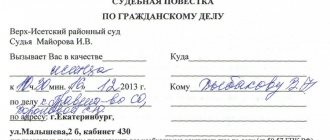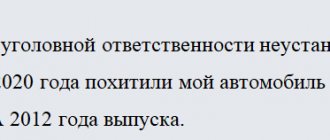In life, a situation is possible when, for some reason, you may find yourself in an investigator’s office during an interrogation. The topic of the conversation can be the actions of your loved ones or acquaintances, the conversation can be about situations that you have witnessed, or about the actions of yourself. The investigator will strive by all legal means (and sometimes not so) to extract the necessary information, therefore, in order not to harm yourself and your loved ones, you need to know how to behave during interrogation by the investigator.
Before appearing for questioning by an investigator, carefully study the recommendations for behavior during interrogation, as well as the powers of officials. This way you will reduce the risk of coming under pressure and giving false testimony.
Rights of the investigator during interrogation
The main task of an investigator is to investigate and solve crimes. To carry it out, the investigator can use various methods, but it is important to remember that his actions during interrogation should only be within the limits established by the Criminal Procedure Code of the Russian Federation.
The main law regulating the actions of the investigator is the Criminal Procedure Code of the Russian Federation.
In accordance with the law, the person conducting the preliminary investigation may perform a number of actions, such as:
- Ask questions relevant to the investigation of a crime or determine the motive of the offender and his personal characteristics;
- Initiate during the interrogation: Creation of photographic materials on the case;
- Recording audio and video recordings of interrogations, surveys and other events in the case;
- Filming an investigative experiment;
However, when conducting an interrogation, under no circumstances does the investigator have the right to take actions that infringe on the rights of citizens, namely, he cannot:
- Ask the interrogated leading questions that initially contain an answer that is most convenient for the investigation, or an indication of it;
- Hint or directly inform the interrogated person about the possibility of “release from investigation” by transferring money to him;
- Use against the interrogated person: Violence;
- Psychological and moral pressure;
- And also express a threat of using such violence against the person being interviewed, under investigation or close people;
The maximum duration of interrogation without a break is 4 hours, with breaks - 8 hours a day.
If you are not confident in your abilities, it is better to seek help
An interrogation with an investigator is always a test. For him, communicating with witnesses, suspects, and obtaining the necessary information is his profession and bread. This is a completely new area for you. So, you are called in for questioning. What to do?
Any word spoken is of great importance, and said incorrectly has fatal consequences. Therefore, going for interrogation without a lawyer is a big risk. Each of us, according to the Constitution of the Russian Federation, has the right to a defense lawyer.
Important!
The right to a lawyer for a detained citizen, arrested, or charged with a crime appears from the moment of detention, arrest, and arraignment.
The Constitution also guarantees free legal assistance. The investigator is obliged to offer him a public defender. But think carefully before agreeing to this.
- If the investigator is very insistent on a free lawyer, perhaps he has his own interest.
- Most often, a free lawyer does practically nothing to protect a citizen - after all, he is not paid.
- There have been absurd cases when the same defense lawyer was assigned to both the accused and the victim.
Important!
Investigators more often “split” educated, self-confident, but not experienced citizens, rather than repeat criminals. If you lost the battle with the investigation, and then the trial, an appeal and a cassation complaint can be your salvation.
Responsibilities of the investigator
General responsibilities of an investigator include:
- Documentary recording of the interrogation procedure;
- Compliance with the procedural elements of the procedure. For example: Warning the interrogated person about liability for giving false testimony;
- Filling out the protocol;
- Collection of signatures of witnesses, etc.
- Sending a summons by courier or mail;
Depending on who acts as the person being interrogated, new duties may be added, for example, the duty to engage a psychologist to interrogate a person under 16 years of age, etc.
Drawing up a protocol
Important!
If the situation takes a critical turn and you are openly forced to give the necessary testimony, remind you of your responsibility under Art. 302 of the Criminal Code of the Russian Federation for coercion to testify. We will tell you more in a separate article https://lexconsult.online/6697-ponyatie-prinuzhdeniya-k-dache-pokazanii-kvalifikatsiya-dannogo-prestupleniya
During interrogation, a protocol must be drawn up. All questions and the answers received are recorded in it. The witness and the accused have the right to fill out the described document with their own hands.
At the end of the interrogation, the investigator hands over the document to the witness for review. If any comments are found, the investigator must make changes to the content of the document. Next, the witness must put his signature on each page of the document. If it is not there, then the protocol is invalid.
Preparation for interrogation before appearing at the investigative agency
According to the Code of Criminal Procedure of the Russian Federation, a person is summoned for questioning by subpoena. A summons is a document containing the following information:
- to whom the summons is addressed, indicating the full name and address of the citizen;
- the authority that sent the summons, the address of the authority;
- name of the document – summons for questioning;
- the main part indicates the date of the summons for interrogation, the location and the official who will carry out the interrogation;
- the status in which the person will testify is also indicated: for example, “possible witness to the incident,” etc.
After analyzing the contents of the subpoena, but before appearing for questioning, you should recall all the circumstances of the case as accurately as possible. This will help reduce the interrogation time, which is beneficial for both the investigator and the person being interrogated.
Always before going for an interrogation, restore in your memory a picture of what happened to save time for both yours and the investigator.
At this stage, if possible, you should also hire a lawyer to:
- Protection of the interrogated person and to ensure the legal order of the interrogation.
- Since the reason for the summons may not be clear from the contents of the summons, the lawyer has the right to contact the investigator in advance and find out the known circumstances of the case.
- If the lawyer is refused to provide information before the interrogation, you should immediately during the procedural action, when the general circumstances of the case are known, ask for a break and build tactics with the lawyer.
In addition, we strongly advise you not to avoid the investigator or ignore his call for questioning. Ultimately, you will be forced to appear for questioning accompanied by a police officer, and your relationship with the investigator will be damaged.
Procedure for calling an investigator
There are common cases when a person receives a call from an investigator to a person’s cell or landline telephone number with an invitation to come for a conversation at one time or another. Moreover, often the servant of the law informs about the need to appear without even explaining the reasons for the call and there is no talk of written notification.
In fact, if we consider this point within the framework of the law, then, according to paragraph 188 of the Code of Criminal Procedure, inviting a citizen for questioning is only allowed by summons. Moreover, the paper must be handed to the recipient against signature.
Subpoenas may be served in the following ways:
- personally in hands;
- by post;
- through relatives living with the person being called;
- with the help of the administration of the organization where the person works.
Accordingly, if a written summons has not been received, then in principle you don’t have to go to the conversation, however, there are many nuances here.
Typically, investigators call citizens by telephone when they do not have the addresses of witnesses, or, for example, the deadlines for the investigation are running out, and urgent explanations are required from eyewitnesses. There can be many reasons, so this method of notification cannot be called illegal. In this case, the investigator does not exactly demand to appear, he rather offers to visit his office to clarify the testimony given earlier, or for other reasons.
Accordingly, in such a situation, it is recommended to still come to the specified address, at least in order to find out what actually happened. Moreover, if the witness does not have time, the investigator will most likely schedule a conversation based on the capabilities of the person being called.
It is important to understand here that ignoring such a call, one way or another, will not help avoid another interrogation. Sooner or later, an official notification will be sent to the citizen’s address. And in this situation, you will have to go to the conversation in any case.
How to behave during interrogation by an investigator. Stage 1.
Investigators are officials representing the state, and, as a rule, they are all decent people who respect the law. But there are also exceptions.
To protect yourself from incompetent, corrupt non-professionals, you should adhere to the following rules:
Have a question for a lawyer? Ask now, call and get a free consultation from leading lawyers in your city. We will answer your questions quickly and try to help with your specific case.
Telephone in Moscow and the Moscow region: +7
Phone in St. Petersburg and Leningrad region: +7
Free hotline throughout Russia: 8 (800) 301-39-20
- If you have a phone recorder, camera, or other recording device, it's a good idea to take it with you. The purpose of the recording may be: Protecting your rights and freedoms. The investigator will ask leading questions, threaten you or blackmail you, you will be able to record this;
- Informing the lawyer about the progress of the interrogation if he was not present at the interrogation or has not yet been hired.
If you want to be treated with respect, try to show respect yourself. If the investigator is younger than you, under no circumstances address him on a first-name basis, because he is, first of all, a representative of the authorities.
Myth 4: It’s easy to refuse a confession, citing pressure.
Retracting previously given confessions is difficult, or rather, almost impossible. It is more likely that confessions will become the basis of a conviction as evidence, even if they are subsequently retracted.
Judicial practice shows that in almost every such case the court uses the following formulation: “The fact that A. subsequently retracted his confession does not indicate their unreliability or illegality.”
In other words, it does not work in such a way that it is possible to refuse testimony at any time without any consequences. Russian courts often evaluate evidence with an accusatory bias. Judges often consider themselves the last barrier standing in the way of crime. As if only they are capable of giving a proper assessment to all the attempts of an experienced accused to fool young or illiterate investigators “around his finger.” When choosing between confessional testimony and testimony that does not confirm the accusation, the court will consider the first to be reliable, and will be skeptical about the second.
You should not give alleged confessions, hoping to recant them in the future. This option is only possible if it is a pre-agreed tactic agreed upon with the defender.
Myth 5: The status of a witness will definitely remain unchanged if you testify against other persons
If the investigator has grounds to prosecute a person, he will always have the opportunity to do so. Incriminating testimony against others may further change the witness's current status for the worse. The explanation is quite simple - such testimony can confirm intent and the fact that the witness was aware of the crime. This may become the basis for proving the witness's guilt.
Moreover, criminal procedure legislation does not provide any guarantees for witnesses who testify against other persons. The witness does not have the right to a pre-trial cooperation agreement. Only the suspect or accused can have it.
No one can guarantee that the investigation of a criminal case will be conducted by the same investigator throughout the entire proceedings. The criminal case may be transferred to another unit, where the new investigator may not know about any previously reached agreements. It is also possible that the corresponding instruction to bring to criminal liability may come from a supervisory or control body.
Myth 6: It is better to hire as a lawyer someone who is advised by the investigator himself.
An active defense in a criminal case may prevent the investigator from proving his version of the crime, especially if there is no evidence in the criminal case, but there are violations of the law during the investigation of the case that one would like to hide. Then the investigator can try to convince the accused to abandon his active defense and take a more accommodating position.
Otherwise, according to the investigator, the accused may receive a real and long sentence, since judges “don’t like such people.” The investigator may insist that if you use the services of a recommended lawyer, “everything will be fine.” Why fight if guilt in a criminal case has been fully proven, and such a position will supposedly only do harm?
In fact, when the accused admits his guilt, agreeing with the position of the investigation, fewer requirements are imposed on the quality of the investigation of the criminal case. After all, there is a high probability that a guilty verdict will be pronounced and no one will go into details. If the defense takes an active position at the investigation stage, it will be difficult for the investigator to break the law with impunity and it may not even reach the court.
Myth 7: It’s better to plead guilty to a lesser crime to avoid more serious charges.
This is another investigator's ploy to extract confessions. So he wants to establish and prove specific actions of a person, which can then be attributed to the objective side of a crime suitable for the investigator. It is the investigator who evaluates the evidence and the events described in the testimony.
Having believed the investigator, the person can confess, hoping that he will reclassify the criminal case as a less serious crime and then stop it. However, the investigator ultimately does not fulfill his promise.
For him, it is quite enough to admit the factual circumstances and confirm the intent to commit a crime. He will give an assessment of these circumstances that meets the interests of the investigation or other persons interested in the outcome of the case. It is impossible to appeal the actions of the investigator on the basis of “unfulfilled promise”.
Stage 2. Interrogation in the investigator’s office
Before starting the interrogation, the investigator records in the protocol the personal data of the interrogated:
- Full name, date of birth;
- Permanent residence address;
- Family status;
- Place of work;
- Criminal record information, etc.
When asking a question about how to behave during interrogation by an investigator, it is important to remember that you have the right to testify in your own hand.
In other words, if you're afraid you'll mumble or fumble your words, you can put them on paper.
When conducting an interrogation, the investigator is obliged to enter into the protocol information about all persons present in the office, and you have the right to demand documents from them. This will avoid the presence of unauthorized persons during the interrogation.
If the question the investigator asks is not clear to you, politely ask for clarification or write it down in the protocol. Make sure that the questions asked to you are recorded not in a draft, but in an official document.
You have the right not to answer a question written in a draft. In addition, no one has the right to force you to testify against yourself - Article 51 of the Constitution of the Russian Federation.
Remember that you have the right to refuse to take any action if:
- If you are being blackmailed;
- If they ask you to sign the protocol without reading it;
- If questions are asked that are not relevant to the circumstances of the case under investigation.
In this case, it is necessary to demand the termination of the interrogation and make an appropriate entry in the protocol. And then you should contact higher management and a lawyer.
If you are beaten, try to resist and leave the premises if possible. If there are marks on the body, contact a medical organization to remove the beatings, and then file a statement with the police.
If you are called to another location
For situations when an investigator calls from another city and invites you for a conversation, we can recommend an algorithm of actions identical to the standard case.
Simply put, it is worth going if you are sure that the call was actually made by a servant of the law, and also if the person himself has the appropriate capabilities. In particular, time and money. In general, procedural costs (costs for a ticket, compensation for wages, etc.), according to Articles 131-132 of the Code of Criminal Procedure, must be reimbursed from the federal budget. Therefore, in theory, the witness’s financial level should not suffer.
However, in practice, investigators usually do not use a telephone call to call citizens living in remote settlements. In this case, a subpoena is sent to the address of the witnesses or victims, or law enforcement officials independently go to their place of residence.
Another option is an assignment for the local police. Investigators from the city where the witness lives carry out the necessary actions on the spot, interviewing those involved in the case.
Investigative tricks and deception of the investigator during interrogation
Of course, not all investigators are as bad as in Russia for some reason people tend to think, but they can also use various tricks and psychological techniques to conduct interrogation and obtain the necessary data from you, even if it is not the truth.
The most common tricks are:
- The investigator may behave like your best friend during the interrogation in order to earn trust and you, having been exposed to his charm, can sign the protocol without reading;
- The investigator may give you a blank protocol form to sign and make notes on the draft, as if, for example, so as not to waste a lot of your time.
- Even if the investigator promises that all your statements will be entered later, this does not mean at all that they will correspond to what you said during the interrogation;
- The investigator may leave empty spaces in the protocol in which you can then write something, so when reading the protocol, put dashes in the empty spaces;
- Pre-planned long interrogations in order to exhaust you and force you to agree to any of his demands just to end the interrogation as quickly as possible;
- The investigator can provide you with a state lawyer in advance who is not interested in your successful conduct of the case, and therefore the investigator’s work is simplified.
In addition to the above, make sure that there are no empty spaces in the interrogation protocol and the investigator will set the time and date of the interrogation.
Please note that Russian legislation is constantly changing and the information we write may become outdated. In order to resolve the issue you have regarding Criminal Law, we advise you to seek the advice of a lawyer in support of the site.
Rules of interrogation: what violations may occur
Investigators often abuse their own position and directly violate the order established by law. And, first of all, we are talking about violating the place and time of the interrogation. The regulation is outlined in paragraph 187 of the Code of Criminal Procedure and is worth knowing about.
The basic rules are:
- The interrogation is carried out at the place of preliminary investigation or, if such a need exists, at the place of residence of the interrogated person. In the latter case, the decision is made by the investigator. The reason may be the citizen’s inability to come to the investigative department, for example, due to illness.
- The duration of the interrogation cannot exceed 4 hours in a row. After this interval, a break of 1 hour must be provided. Further, the interrogation can be resumed, but again only for 4 hours. The total duration of the conversation per day should not exceed 8 hours.
- A citizen summoned to the investigator has an unambiguous right to use the services of a lawyer (Articles 49-50, 56 of the Code of Criminal Procedure of the Russian Federation). The rule applies to all cases and provides protection from unlawful actions of the inquiry officer or investigator.
- When interrogating a person who does not speak Russian well, an interpreter must be called.
- Identification of persons or objects is always accompanied by the presence of witnesses.
- The interrogation of minors or children under 14 years of age is carried out exclusively with the participation of a teacher. The presence of the mother, father or other legal representative is also permitted.
Additionally, other criminal investigation officers or simply representatives of the police may be present during the interrogation. Typically, such measures are necessary if the interrogated person behaves violently.
How to answer questions
There are universal conditions that must be met regardless of the position established by the lawyer.
They should be used especially by those who, for whatever reason, have not taken care of their own defense or do not have confidence in the public defender. First of all, you should say as little as possible, not expand on anything, the information expressed should be unambiguous. This is important for the one being interrogated, because he will begin to clearly understand the image of the picture being built. The question of behavior during the inquiry is also important to create a sense of truthfulness and sincerity.
If the investigator understands that some information is being hidden by the person being interviewed, the further interrogation will be accompanied by numerous tricks, and will also pursue a specific goal - to find out the hidden information.
There are no specific rules for portraying truthfulness, because during interrogation a significant distortion of a person’s psychological state occurs. However, it is better to communicate with the investigator by providing reliable information, or with some reticence in accordance with Article 51.
It is necessary to get rid of too common judgments, since their meaning can be viewed from points of view that the person being interrogated may not be aware of.
We must not forget about the emotional aspect. Attempts at psychological pressure, even if it is hidden, are a tool that is very often used by investigators to ensure the desired result.





